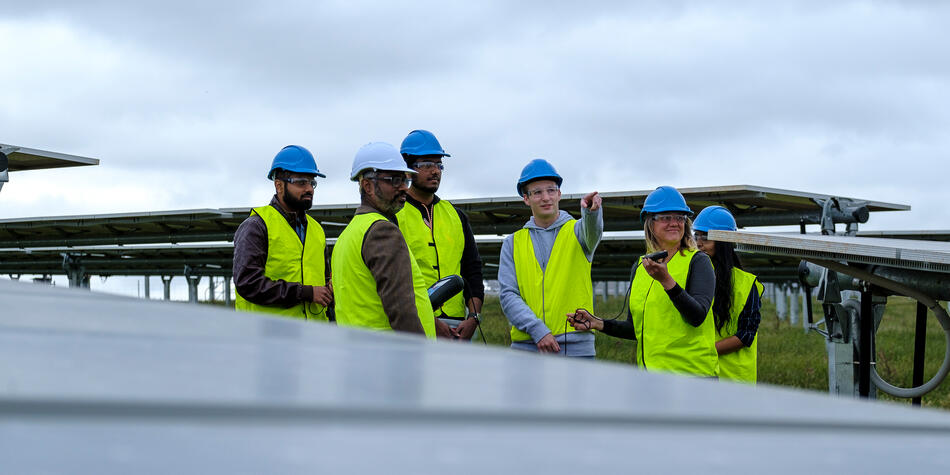Deakin University's commitment to sustainability received a significant boost today with the official opening of the $23 million Deakin Renewable Energy Microgrid at the Geelong Waurn Ponds campus.
Deakin Vice-Chancellor Professor Iain Martin was joined by Dr Alan Finkel AO, Special Adviser to the Federal Government on Low Emissions Technology, to turn the key on the industrial-scale Microgrid, the largest solar farm ever built on an Australian university campus.
Professor Martin delivered an impassioned address, using American President John F Kennedy's Rice University speech in 1962 as an inspiration, likening NASA's Apollo program to the scale of ambition required to achieve global carbon neutrality.
Demonstrating sustainability leadership
'Australia is in a strong position to benefit from moving rapidly in this endeavour, and at Deakin, we believe we have a duty to use our capabilities and assets to demonstrate both ambition and leadership on the issue of renewables,' Professor Martin said.
'We want to be a working example – a 'living lab' – of how a large organisation can lead through its actions and fundamentally change its ways of doing. This includes the complete, systemic integration of sustainability across all our activities.'
'However, to achieve a sustainable energy future in Australia, it will require a long-term, cross-sector, collective effort. We require a bi-partisan political commitment over the next few decades; the political and community leadership required will be significant.'
The Microgrid at Deakin provides a unique opportunity to make a positive contribution in the collective fight against climate change while also conducting high-value research to benefit Australian communities.
Designed and built in partnership with AusNet Services and Mondo Power, the Microgrid comprises a 7-megawatt solar energy farm and 2 megawatt hour central battery storage system on 14.5 hectares, a 0.25 megawatt distributed rooftop solar generation and storage system, and a Research, Teaching and Visualisation Centre located in the Centre for Advanced Design Engineering Training (CADET) building.
Generating energy on campus
Dr Adrian Panow, Director of Deakin Energy, explained that the project is underpinned by more than 23,000 solar panels on the solar energy farm and a further 833 panels on campus rooftops, including student residences.
Cutting emissions and pioneering research
'Ultimately, the Microgrid will supply more than half of the campus' energy consumption and reduce greenhouse gas emissions by 12,000 tonnes each year,' Dr Panow said.
'The scale of the Microgrid project is important in two ways: achieving our carbon neutral objectives and providing a platform for industry-relevant research. The research focus incorporated into the design of the infrastructure builds on consultation with universities around the world, including Princeton and the University of California at San Diego.'
Deakin is committed to educating the next generation of industry professionals, providing staff and student learning, and creating research and employment pathway opportunities.
The Deakin Energy platform draws on internationally recognised capabilities and facilities for sustainable energy development across Deakin, including the Institute for Frontier Materials, BatTRI-Hub, the Institute for Intelligent Systems Research and Innovation (IISRI), and the Faculty of Business and Law.
With the Microgrid the latest asset to go fully operational, Deakin is realising its integrated and comprehensive response to the challenge of meeting growing energy demands in an environmentally, ecologically, socially, and economically sound way.
This article was published by Deakin University. Read the original article here.

